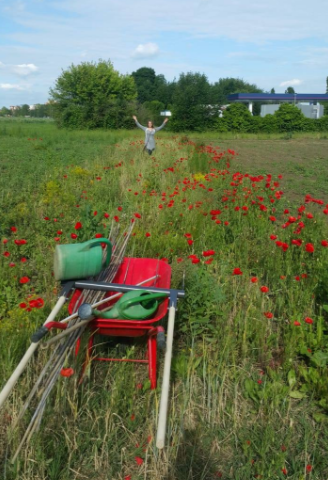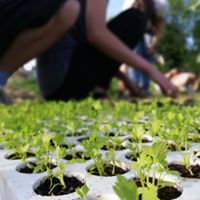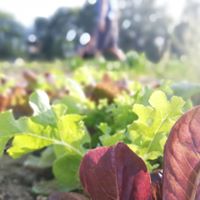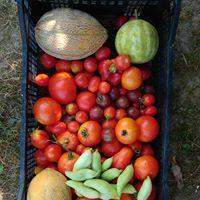Student Garden

A garden for student volunteers from the University of Zagreb to grow and produce organic vegetables.
Key words: university, student garden, urban agriculture
Short description
Name of the initiative? Student Garden
Country Croatia
Region Zagreb
What kind of initiative Farming/production, Education/training, Environmental, Biodiversity, Landscape, Community
The Story
During the final year of my master’s degree in horticulture I felt there was a huge need for students to have a place where they could put all the theory they had learned into practice. Not everybody in the Faculty of Agriculture was from a rural area. Not everybody lived in a house with a garden. I lived in a flat. I didn’t come from an agricultural background, my family doesn’t own any land, so it was for selfish reasons – I wanted a place to garden – but I also wanted to do something that would benefit others like me. During my studies, I met a younger colleague who was as interested in this idea as I was so her and I formed the core duo needed to kick off the project. We started in the spring of 2018.
“I didn’t come from an agricultural background, my family doesn’t own any land, so it was for selfish reasons – I wanted a place to garden – but I also wanted to do something that would benefit others like me.”
First, I spoke to one of the professors in my university department (vegetable production) about the idea to start a student garden. ‘Wouldn’t it be great if we had a place to garden in an organic way? Perhaps we could offer the produce at faculty events or student meetings?’ She really loved the idea and then it was up to her to find us a piece of land. After we got the green light from the department, I spoke to the vice dean of the faculty and presented her with the idea. All doors were open to us and we got full support. They were very happy for this initiative to exist; they just didn’t have the capacity to run something like this themselves – and it doesn’t make much sense for the faculty to organise something for the students that really should be led by the students.
“They were very happy for this initiative to exist; they just didn’t have the capacity to run something like this themselves – and it doesn’t make much sense for the faculty to organise something for the students that really should be led by the students..”
We were given a plot of land of approximately 300 square metres. My colleague made a poster to advertise, we printed them and stuck them up on the agricultural faculty buildings. 30 people came to our first meeting. The next meeting 15 came back and at the third meeting we had around 10. This 10 made up the core group.


I was a very good student and had excellent contacts with my tutors. I was known for being passionate and reliable – if I made a promise, they knew I’d come through on it. I feel this was an important step for collaboration with the faculty because they trusted us so much, also with the equipment and access to important facilities, so it was important to me that we did’t let them down.
“I was known for being passionate and reliable – if I made a promise, they knew I’d come through on it. I feel this was an important step for collaboration with the faculty…”
The student volunteers who made up the core group were really passionate, motivated and wanted to contribute to something bigger. Those of us in the final years of our study felt if we don’t do this, no-one else will. We were a diverse group of people, from different academic years, of different ages and backgrounds. One colleague had come to university in her late forties after her son had grown up, another young man came from a music background and decided organic farming was what he really wanted to do. I made friends for life. Some of us had autoimmune diseases, and so we understood how important healthy organic food is. Our intrinsic individual motivation helped us start, but once we all got to know each other, it was easy to stay, even when work got tough.
“Our intrinsic individual motivation helped us start, but once we all got to know each other, it was easy to stay, even when work got tough.”
Some friends from my class thought I was crazy starting the garden – who in their right minds will want to come to work on a plot of land after a long day of classes, especially in the summer heat near a humid forest with a lake swarmed all day by mosquitoes? To be fair I looked as if I had some serious allergies after all the mosquito bites, but that was part of the charm of working in the garden. We were so focused we’d often stay in the rain and after dark because the work needed to be done that day. All the hardships brought us together.
During the summer months when the garden is most abundant and needs most of the work, students who don’t live in Zagreb need to go back home. 300 square meters may not be big, but we discovered it’s not really small when you are trying to manage a large variety of vegetables with just 2-3 people who are juggling studying for exams and other responsibilities. Due to heavy rains that lasted for two weeks, the first year some of the weeds grew over my head (and I’m 177 cm!). The next summer we learned to pull in friends, boyfriends, girlfriends, to help. We recruited a few new people with that way too – students who weren’t studying agriculture.
I worried what would happen to the project after I left the university. I extended my studies for a further year to finish my thesis and focus even more on the Student Garden. In the second year we approached the garden more systematically: making interdisciplinary workshops bringing together students of landscape architecture, organic agriculture, horticulture etc. We were given a bigger plot of land by the faculty – 2000 square metres – so, we used the expertise of these different disciplines to plan the garden better. We had better cooperation with the faculty itself. Some of our professors helped us sow plants for green manure and supplied us with any seedlings we asked for. In 2019 I handed over the garden to new students. I was really glad to see girls just as passionate as I was continuing the project. I meet up with them to help them plan ahead, to prepare for some of the challenges we faced and hopefully learn from our mistakes!
“If you have an idea but it doesn’t seem like it’s the perfect timing – not all the stars are aligned – get on with the project anyway. Many people are afraid to start something themselves, but they would gladly join a project.”
If you have an idea but it doesn’t seem like it’s the perfect timing – not all the stars are aligned – get on with the project anyway. Many people are afraid to start something themselves, but they would gladly join a project. Perhaps you are not aware of how many connections you have; how many people you know who are interested and would be able to help you. I believe if you have the will to do something, everything will align eventually. The Student Garden team is now formalising their work – becoming an association, which will help with funding etc. Something that started as a dream of mine is now becoming a proper organisation.
I can only imagine how much I would have learned; how different a view I might have had if an initiative like this had existed earlier in my studies; if I’d had older, more experienced students to look up to and a playground to experiment with and learn from. I hope new generations of students will use this opportunity to extend their knowledge and gain new aquaintances.
The Student Garden is a great legacy. I’m so happy that I’m not a part of it anymore and yet it still lives on.

Additional information
https://www.facebook.com/studentskivrt/
https://www.instagram.com/studentskivrt/
—
Repository compiled in February 2020 by: Marija Zrnic
E-mail contact: marija.zrnic46@gmail.com



